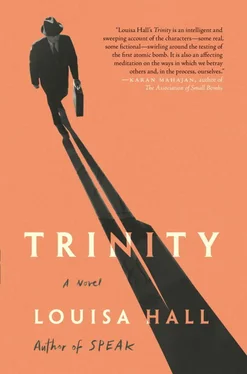Then I’d picture the scene: me and my little brother, out on the back stoop, the moths knocking themselves out on the streetlight.
May had gone into the bedroom to sleep. You could smell the jasmine crawling over the opposite fence. Warren was standing, leaning on the stoop railing, and I’d taken a seat on the steps.
For a while, we stayed out there without having much to say to each other. It was a strange moment between us. Warren was shipping out the next morning. It was the end of our three days together, and now that we were alone we both felt compelled to imitate a brotherly closeness.
We sat there in silence. We were trying, I think, to come up with something to say. Something conclusive to allow us to imagine that in the course of three days, we’d gotten close. That I’d miss him, and that he would miss me. That we’d be in each other’s minds even after he’d shipped out in the morning.
But it wasn’t that easy. How do you miss a brother you never really knew in the first place? The last time I’d seen Warren was when he was a kid, when my mother packed up the car and asked which of us would come with her. He went, and I stayed. And then he showed up ten years later, the week before he shipped out to the Pacific, and it’s true that nothing went wrong.
He stayed with us in the new house. He met May. We played cards. We had a good time. We smoked cigarettes and listened to records.
But there was still something unnatural about it. And that last night, on the back porch, neither one of us knew how to take his leave in a way that would seem normal. We sat there in the darkness, with the jasmine vines in the alley, and the streetlight flickering, and the dog a few yards down occasionally yowling, and I couldn’t think of the right thing to say, so I was grateful when he started talking. But then I realized where he was going: Asking about where May grew up. Asking about where she went to high school.
I got a metal taste in my mouth. Then I stood up, stubbed out my cigarette, and headed back into the kitchen, and Warren left the next day. I drove him to the base.
The whole way there, neither one of us spoke. At the gate, with those enormous ships flying their flags behind us, we both got out of the car. We stood there awkwardly for a moment: me and my brother, who I’d never known all that well in the first place.
My last memory of him was when he was a kid, his face a moon in the car window, jutting out from the jumble of suitcases and lamps and spare pillows our mother thought to throw in there. Now he was grown and getting ready to ship out to fly planes over Japan, and the point he wanted to make never got made. That conversation just hung in the air around the back stoop, gathering the importance of conversations that never got finished.
After that, I had trouble sleeping. At work, I tried to stay focused. I remembered the major directives. Be overaware of the details, Pash said to us during training. Heed atmospherics. Your gut feeling is usually right. But after Warren shipped out, I was in a strange state. Not unhappy, exactly, just wakeful. Alert to the task of finding evidence.
Because, of course, at that point I had a good life. Even though it was wartime, I was happier than I’d ever been. I was lucky to be in the counterintelligence game, stationed stateside, living in a new house with my new wife. I liked our life together. May was so funny. So good at cards. After dinner, we sat together, and while she was racking up wins, she’d make clever jokes. And sitting there across from her, I was so happy, so I had to find whatever evidence I could find that Warren was wrong about what he’d suggested.
Then, after May and I went to bed, I often lay awake. That’s when I realized how often she got up in the night. More nights than not, she woke at some point and threw off the covers.
Silently, she’d rise from the bed. Then, gently, she’d pull the sheet back over her absence. Then she’d cross the floor and move out of the bedroom.
Once she’d closed the door, I sometimes heard water running in the hall bathroom. Other times I realized she must have gone somewhere else.
Sometimes she stayed out a long time. I lay there in bed, wondering where she’d gone off to. Did she sit at that kitchen table? Did she read a magazine in the armchair? Maybe she ventured farther. Maybe she was on the back stoop. Or maybe she was walking down the back alley, past the fences covered with jasmine, past the Millers’ dog in its doghouse.
Later, when she came back into the bedroom, she was always so quiet. And where, I wondered, had she learned to slip so silently into a room? When had she practiced those noiseless footsteps?
At her touch, the latch of the door was a cat’s tongue. I had to wait for an angle of moonlight from the hall window to open over the floorboards to let me know that she hadn’t left me.
What a relief it was, that pale fan of light spreading over the floor. Then closing again. And May’s shadow, returning to join me.
WHICH IS ALL ONLY TO SAY THAT MY HEAD WASN’T ENTIRELY STRAIGHTwhen I followed Opp into the city. I tried to note what I could. When the train pulled into the station, for instance, he was the first person out. I tried to follow, but I got stuck behind an old woman, and for a moment, out on the platform, I was almost worried I’d lost him.
But then there was that porkpie hat, sailing ahead. And then I’d maneuvered myself to see his whole body. He was leaning forward, walking with one hand stuffed in his pocket.
Even now, I can see it so clearly. The way he walked with that jerky stride, like a big marionette. He moved in a way that was slightly unnatural, as if someone else had the strings and was awkwardly controlling the movements.
Even so, he moved pretty quick. I had to pick up my pace not to lose him.
“THE FUCK’S HE WAITING FOR?” FRANK SAID WHEN I’D CLIMBED INTOthe De Soto. His crossword was folded up on the armrest.
Opp had come to a stop in front of the station. He was standing beside a fat man who kept mopping his face with a handkerchief. I took another photograph. I focused on the space between the big man and Opp. I was looking to see if they touched each other, even just slightly. A brushed sleeve, some kind of contact. Some kind of sign revealing that the fat man was Opp’s contact.
But then a few minutes later, without so much as exchanging a glance, the fat man picked up his suitcase and exited the frame. When I put the camera down, I watched him maneuver himself into the low passenger seat of a black sedan that had pulled up in front of the station.
Frank lit a cigarette and leaned back in his seat. “That fat man looked like a woman,” he said.
I didn’t answer.
“Unfortunately that’s what happens to fat men,” Frank said. “At some point they become women.”
Oppenheimer was still on the curb. He was peering across the street with that same blinded look. I kept the camera trained on his face. I wanted to note the precise moment when there was a shift in his expression, so it was Frank who first noticed the girl.
“Who’s the piece?” he said.
I put the camera down. Frank tilted his chin toward the opposite sidewalk. The girl had stopped in her tracks. The other pedestrians were streaming around her, and she was smiling at Opp. She’d lifted one hand to get his attention. Then she stepped off the curb.
For a moment, before she got ahold of herself, she broke into a run. She was still waving. Then she slowed herself back down to a walk, but anyway her hand was still up in the air. It seemed sort of exposed. Left out in the open.
I turned back to Opp. He’d clearly seen her. In the meantime, he’d started smiling.
Читать дальше












